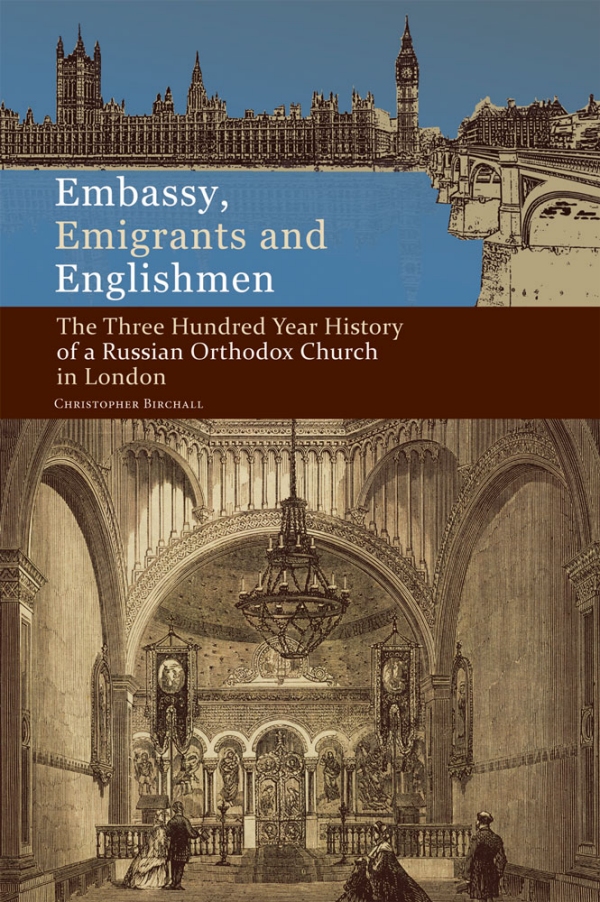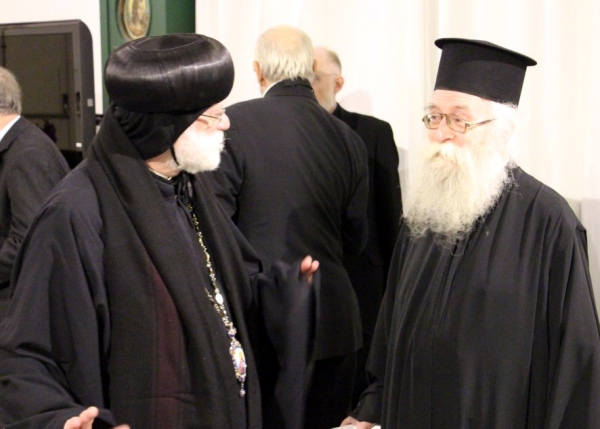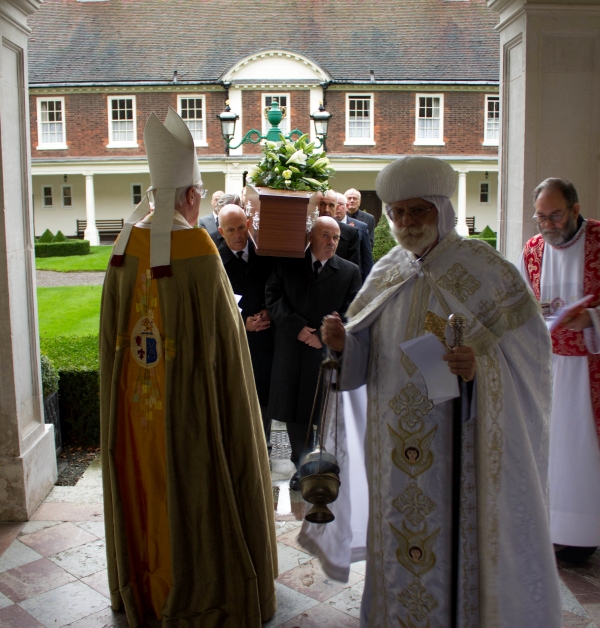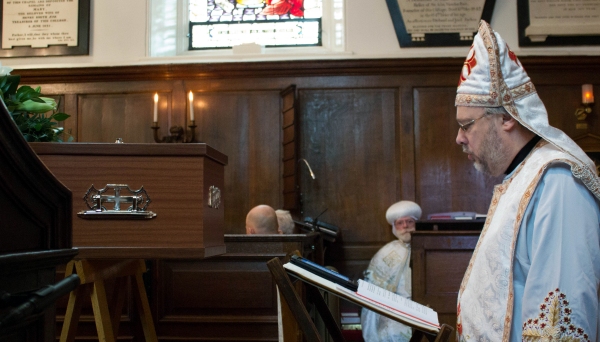BOC Portsmouth Congregation represented at House of Bethany
Subdeacon Antony-Paul Holland represented Father Simon Smyth (who had been invited but was, regrettably, unable to attend) and the British Orthodox Portsmouth congregation at a Mass held on 5 November for the installation of Mother Rita-Elizabeth as Superior to the Society of the Sisters of Bethany for a further five years. The British Orthodox Church of Saint Mary the Mother of God and Saint Moses the Black in Portsmouth and the Society of the Sisters of Bethany in neighbouring Southsea enjoy warm ecumenical relations. Mother Rita-Elizabeth and other sisters have joined the British Orthodox congregation for celebrations of the Divine Liturgy and British Orthodox members from both the Portsmouth congregation and from Southampton have attended Quiet Days at Bethany House and stayed on retreat there.
Bishop Trevor Wilmott of Dover, the Episcopal Visitor for the Society, led the celebration of the Mass. He was assisted by the House Chaplain, Father John Preston (a good friend to Orthodox locally). During the service Mother Rita-Elizabeth was brought before the congregation, then before Bishop Trevor she made her vows again as Superior to which she had recently been re-elected by her Sisters. It was with great joy that she was welcomed by all those present, who included several priests, monks and nuns from various parts of the country and ecumenical friends.
After the service a buffet lunch was enjoyed in the garden with opportunity for ecumenical friendship and conversation.
British Orthodox clergy speak at Moorland’s Bible College
At the invitation of Alistair McKitterick, Tutor and Lecturer in Biblical and Theological Studies, two British Orthodox priests delivered lectures this month to students at Moorlands Bible College, Sopley, Christchurch, Hampshire. On 5 November Father Peter Farrington lectured on prayer and one week later, 12 November, Father Simon Smyth gave a richly illustrated presentation on icons.
Introducing himself as both a former Moorlands student (from the late ‘eighties) and a former evangelical Christian enabled his evangelical audience to more easily relate to Father Peter and more easily identify with his lecture. Referring to the teaching of Evagrius that if “you are a theologian you truly pray” and if “you truly pray you are a theologian” Father Peter emphasised the importance of knowing God through the encounter in prayer rather than academically knowing things about God. The lecture ranged through Saints Cyril of Jerusalem, John Cassian, John Chrysostom, Moses the Black and others, referring also to the contemporary Orthodox writings of Metropolitan Kallistos Ware. Father Peter was careful to emphasise the apophatic approach and how closer encounters with God in prayer contrast with the modern tendency to almost analyse or understand God. In a wide ranging talk Father Peter also spoke on the importance of fasting and, of course, the Jesus Prayer.
Father Simon gave his presentation on icons at Moorlands for the fifth time (first visiting the college in 2009). The classic text of Saint John of Damascus was discussed and the Incarnation emphasised again and again as the requirement for icons: the “very heart of Christianity is Christ, God incarnate, God made flesh…. To see Jesus is to see the (otherwise) invisible God.” The union of God with man in accordance with the teaching of Saint Cyril the Great of Alexandria was emphasised. “To speak His Name is to speak the Name of God. To see His Face is to see the Face of God. To depict Him is to depict God.” Several icons were analysed in more detail including a modern icon of our Lord God and Saviour Jesus Christ:
And an icon of the Apocalypse:
![]()
Several different icons of the Good Shepherd were contrasted, then of Saint Moses the Black and also of Saint Simon the Tanner; 12 November being the first of the three days added to the Advent Fast in perpetual memory of the three days of fasting and Saint Simon’s part in God’s miraculous deliverance of the Coptic Orthodox Church in the tenth century.
Some students however acceptable they found the theology of the presentation clearly struggled with an emotional response to the idea of kissing an icon. Father Simon’s honesty in frankly acknowledging (though now the most natural thing in the world for him) how difficult he had once found it, with his then evangelical protestant background, to force himself to first kiss an icon seemed to help facilitate discussion around this. The session finished with all present each sitting in prayerful silence for a few minutes before an icon of our Lord God and Saviour Jesus Christ.
Abba Seraphim’s mother suffers stroke
On 6 November, Mrs. Joyce Edwards, the centenarian mother of Abba Seraphim, suffered a cerebral haemorrhage and was admitted to the specialist Stroke Unit of the Princess Royal University Hospital at Farnborough, Kent. Initially her entire left arm was paralysed, but over the next few days she began to move the upper arm. She has suffers no other paralysis and her speech and intellectual powers remained unimpaired. On 10 November she was transferred to the Stroke Unit at Lewisham Hospital, which is nearer to her home.
Russian Parish History – Book Launch

To mark the publication of Embassy, Emigrants, and Englishmen. The three Hundred Year History of a Russian Orthodox Church in London, a reception was held on the evening of Tuesday, 4 November, 2014. The publishers of the book, Holy Trinity Monastery, Jordanville, USA, and the Cathedral parish of the London Russian Orthodox Church Abroad hosted the reception.
The Book Launch was a unique occasion, being held in the former Russian Imperial Embassy Chapel, dedicated to the Dormition of the Most Holy Mother of God, in Welbeck Street, London. The occasion was marked by the prayerful chanting of ‘Heavenly King’ at the commencement, and by the chanting of ‘It is meet and right’ at the conclusion – almost certainly the first time Russian Orthodox chanting had been heard in the Chapel since its closure in 1923.

Speakers at the reception included His Eminence, Archbishop Mark of Berlin, Germany and Great Britain; His Eminence, Metropolitan Kallistos of Diokleia; Reader Nicholas Chapman, Managing Director of HTM Publications; Deacon Peter Markevitch, Marketing Manager of HTM Publications; and Reader Nicolas Mabin of the London Cathedral parish. Unfortunately, the author of the book, Protodeacon Christopher Birchall, who now lives in Vancouver, Canada, was unable to attend the reception due to ill health.
Honoured guests included: Archpriest Maxim Nikolsky, representing His Eminence, Archbishop Elisey of Sourozh (Moscow Patriarchate); Deacon Meliton Oakes, representing His Eminence Archbishop Gregory of Thyateira; Archpriest Thomas Hardy, Archpriest Peter Baulk, Archpriest Andrew Philips, and Priest Vitaly Serapinas (ROCOR); Archpriest Stephen Platt for the Fellowship of Saint Alban and Saint Sergius; the Most Reverend Metropolitan Seraphim (British Orthodox Church: Coptic Patriarchate); the Right Reverend Bishop Richard Chartres of London (Church of England); Archpriest John Salter (Melkite Greek Catholic Church); the Revd. Dr William Taylor (Anglican & Eastern Churches Association); the Revd. Father Mark Woodruff (Society of Saint John Chrysostom); Count Nikolai Tolstoy-Miloslavsky; Count Andrei Tolstoy-Miloslavsky; Counsellor Artem Kozhin (Embassy of the Russian Federation to the United Kingdom); and Richard Bowden of the Howard de Walden Estate.

Abba Seraphim, who had last visited the former chapel some 45 years ago when it was owned by the Institute of Radiology, expressed the view that it was utterly appropriate to launch this excellent book here. “Protodeacon Christopher has written a brilliant book, the very model of how such histories should be written and we owe him a great debt for having persevered over many years to bring it to fruition.”
Funeral of Father Michael Robson

The funeral of Father Michael Robson took place on 3 November following the celebration of the Divine Liturgy in the chapel of Morden College, Blackheath, where he had lived and died. Abba Seraphim was the celebrant, assisted by Father Peter Farrington (who delivered the homily) and Subdeacons Michael Kennedy, Antony-Paul Holland and Trevor-James Maskery. Also participating was The Right Rev’d Michael Colclough (formerly Bishop of Kensington) as assistant chaplain to Morden College. Bishop Michael was with Father Michael when he died and had said the Prayers of Commendation at his passing. Mourners included Father Michael’s family, many who had travelled up from the West Country; friends, members of the Orthodox Church and other residents of Morden College.

In his address Father Peter drew on St. Paul’s words to the Corinthians (1 Cor. I: 25-29) about how God uses the foolish things of the world to confound the wise.
Because the foolishness of God is wiser than men; and the weakness of God is stronger than men. For ye see your calling, brethren, how that not many wise men after the flesh, not many mighty, not many noble, are called: But God hath chosen the foolish things of the world to confound the wise; and God hath chosen the weak things of the world to confound the things which are mighty; And base things of the world, and things which are despised, hath God chosen, yea, and things which are not, to bring to nought things that are: That no flesh should glory in his presence.
“Father Michael Robson was my parish priest. He passed away two weeks ago while I was away from home, engaged in ministry in Italy. The last time I saw him was at the regular Liturgy we have been celebrating at Morden College, where he had been living for the past 14 or 15 years. He had been looking increasingly frail over the last year or so, yet seemed most alert during the liturgical prayers which had formed so much the focus of his own spiritual life.
I remember well the first time that I met him. It was perhaps 25 years ago. I had begun my journey towards Orthodoxy and had been reading many books. Eventually it seemed right to make contact with the Orthodox Church. I happened to send a letter to Abba Seraphim, the man who became my bishop and received me into the Orthodox Church 20 years ago. He invited me to Stacklands Retreat Centre, not too far out into the countryside in North-West Kent.
I spent the evening with my own father, with Metropolitan Seraphim and Father Michael. We walked in the grounds of Stacklands Retreat Centre, where he was the Administrator for over 20 years, and then shared in a meal together. I was touched immediately by his gentle spirit and humble manner of conversation.
In the years that followed that first meeting I met him often, and then together with Subdeacon Michael Kennedy, as we continued our journey towards Orthodoxy. He celebrated the Orthodox Liturgy at Stacklands every six weeks, usually with Metropolitan Seraphim, so that we could have an experience of Orthodox worship.
In 1994 I became Orthodox, and a few of us began to pray together in Maidstone. When the opportunity came to use the Chapel at the Maidstone Cemetery, Father Michael began to celebrate the Liturgy with us, and for 15 years or so he served as the priest of our Community of St Alban, worshipping first in Maidstone at the Cemetery Chapel, and then in our own little church of St Alban in Chatham.
Father Michael was a man of prayer, and a priest who celebrated the Liturgy with great care and reverence. His service at the altar was both the foundation and the fruit of his personal spirituality. He was one of those spiritual fathers who led by example, a true pastor. How often he would remember some anniversary and send a little greeting. And at every Liturgy there was a list of his own intercessions on the altar. Over the years I worshipped with him I saw his appreciation and understanding of our own Orthodox spirituality flourish and become an important aspect of his own preaching.
He had attempted to become ordained within the Church of England on several occasions in his life, and his own biographical notes record how committed he had been to service of God in the Church from his earliest years.
The passage from the letter to the Corinthians which I have chosen as the theme of this homily perhaps applies well to Father Michael. He was no fool by any means, but in the eyes of the world it had seemed that he did not have the qualifications preferred for service as a priest. He failed various academic tests on various occasions and these became obstacles in the fulfilment of his vocation.
But in fact the ways of God are not the ways of the world. And in the will of God he found himself the Administrator of a Retreat Centre, and able to lead that life of prayer and quiet pastoral care towards which he had always been attracted. I am sure that it was his years at Stacklands, over 20 of them, which prepared him more for his service as a priest and pastor than the several interrupted attempts at gaining academic qualifications.
He was not mighty by any means, nor was he considered academically wise by the standards of the world, but he had a spiritual strength which sustained him, not least in the long illness at the end of his life. And he had a spiritual wisdom about him, which was the fruit of years of prayer and pastoral care.
Outwardly speaking, Father Michael was one of the weak, one of those chosen by God to confound the world. He relied in humility on the grace and strength of God, and so was able to be used by God in the service of others.
There is a danger for each of us that we approach our service to God and others as if we were strong in our own strength and abilities, and so were offering God something of which he had need. But there is in us no good thing apart from the grace of God. All of our abilities and skills are of no value, indeed they are harmful to us and to others, when we treat them as something we have that makes us strong and wise in our own strength.
How are we to serve God and others? It is surely with a humble sense that we are indeed weak, and that even our sense of being strong and capable is an aspect of that self-delusion to which we are prey. We should not pretend that we are weak while actually believing we are strong. Rather we should confess gratefully that every good gift, every talent, every ability, is already given by God and properly belongs to God who gave it.
It seems to me that Father Michael lived in such a manner. He was well aware of his limitations, but gave his whole life over to God to be used as He willed. And receiving that sacrifice, offered in humility, God used Father Michael to bring peace and grace and life to all those he served as priest and pastor.
He visited Egypt with Metropolitan Seraphim, and was very touched by the crowds who gathered around him seeking a blessing. He would not have thought himself worthy of such attention, but the faithful Orthodox in Egypt appreciated his gentle spirit and the savour of the Holy Spirit which was upon him.
Nearly six years ago, after many years of faithful service as a priest, Father Michael became suddenly very ill, and almost entirely debilitated overnight. I remember the last time that he stood at the altar in our little Church of St Alban, being supported by myself and Subdeacon Michael Kennedy. It was too much for him even to hold the chalice. Yet even in the last years of his life he would remember family and friends by name and ask after them. He continued to show that pastors care as far as his condition allowed him. He never ceased to be a priest, becoming most alert during times of prayer and worship.
What should we say? From a worldly point of view he had failed to become a priest until well advanced in age, and then had to retire from an active service during the last years of his life. Everything about him seemed to represent weakness according to the values of the world as St Paul writes. Yet he was manifestly used by God in ways that he had not expected or imagined.
It is unlikely that I would have become Orthodox myself without his faithful and humble witness. It is unlikely that our community in Maidstone and then in Chatham would have persevered to the present day without his faithful and humble service. To a very great extent my own service as a priest is rooted in his own ministry and example, and I stand as fruit of his own ministry over many years of quiet and selfless commitment to those in his care.
It must have seemed to Father Michael that he lacked those abilities which the world requires in those who are considered successful. He was turned away from ordination on several occasions. But God had other plans and views us all from a different perspective. Hidden away from the world as Administrator of a Retreat Centre, God was nurturing those qualities which were later to be so important in his ministry as a priest. He became strong in faith and wise in the Spirit through years of prayer and service. Offering that which he was, however humble in the eyes of the world, he became one of those worthy of honour in the world to come.
He was, to many of us, a father and friend, a spiritual man, an example of faith. May he rest in peace, having laid up a treasure in heaven, and rise to eternal life.
Father Michael Robson, Memory Eternal! Memory Eternal! Memory Eternal!”
